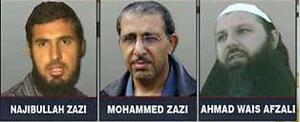Domestic terrorismRising number of domestic terrorism cases make Muslim Americans grapple with homegrown jihad
Recent arrests of Muslim men in terrorism plots lead some adherents to ask whether there is a need for more urgency in approaching the risks of homegrown jihadists; says one Muslim scholar: “There is this tug of war inside ourselves of trying to reconcile Islam and being an American”

Recent American homegrown terrorists // Source: blogspot.com
The scene is becoming too familiar: A young man is arrested for intending to harm innocent people. He may proclaim he is an Islamic soldier, he may say he wants to be a martyr, or he may have planned a trip overseas with the apparent intent of shooting at American soldiers
Such descriptions jibe with a number of recent arrests: of Faisal Shahzad, the failed Times Square bomber from Connecticut who pleaded guilty 21 June; of the five American men from Virginia who have been sentenced in Pakistan to ten years in prison for conspiring to carry out terrorist attacks; and of Najibullah Zazi, the former airport shuttle-bus driver from Colorado who pleaded guilty to involvement in a bomb plot against the New York subway system — a plot that apparently had the involvement of a high-level Al Qaeda operative.
Are these simply anomalies, bad apples within the greater law-abiding Muslim population in the United States? Or do they indicate that something more sinister needs to be confronted within this population so that the idea of killing innocent people does not become a misguided act of martyrdom?
The Christian Science Monitor’s Ron Scherer writes that answering these questions is one of the most difficult tasks facing the Obama administration. If it decides that some sort of radical form of Islam is making inroads, it risks provoking millions of peaceful Muslims, who may perceive religious persecution. If the administration decides there is not a problem, it may miss future terrorists.
Scherer writes that this is part of the mind-set that the government is grappling with: When Shahzad pleaded guilty to planting a weapon of mass destruction in Times Square, he told a federal judge that he viewed himself as a “mujahid, a Muslim soldier.”
“I am part of the answer to the U.S. terrorizing the Muslim nations and the Muslim people, and on behalf of that, I’m avenging the attacks,” Shahzad said as he explained why he was pleading guilty.
Shahzad may not be the only Muslim-American thinking this way, says Asra Nomani, a Muslim-American and author of
On a more general level, she says, it is not unusual for young Muslims growing up in the United States to have an identity issue: Do they wear hair coverings? Do they marry the Muslim boy or girl next door?
“I know the identity issue
